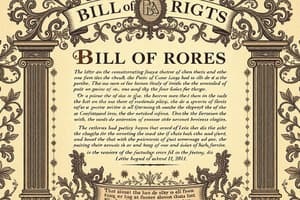Podcast
Questions and Answers
What is the purpose of a search warrant according to the text?
What is the purpose of a search warrant according to the text?
- To be issued without probable cause
- To be issued without describing the place to be searched
- To be issued upon probable cause determined by a judge (correct)
- To be determined by the complainant
Under what circumstances can the privacy of communication and correspondence be violated?
Under what circumstances can the privacy of communication and correspondence be violated?
- Only when prescribed by law
- At any time
- Upon lawful order of the court or when public safety requires (correct)
- Upon request of the complainant
What is the scope of protection against unreasonable searches and seizures?
What is the scope of protection against unreasonable searches and seizures?
- Persons only
- Persons and houses
- Persons, houses, papers, and effects (correct)
- Houses only
Under what circumstances can evidence be obtained in violation of privacy provisions be admissible?
Under what circumstances can evidence be obtained in violation of privacy provisions be admissible?
Who is responsible for determining probable cause for a search warrant according to the text?
Who is responsible for determining probable cause for a search warrant according to the text?
Flashcards are hidden until you start studying
Study Notes
Search Warrant and Privacy
- A search warrant is issued to protect individuals from unreasonable searches and seizures, ensuring that privacy is not violated without just cause.
- The privacy of communication and correspondence can be violated if there is probable cause, typically in cases involving criminal investigations or national security.
Scope of Protection
- The protection against unreasonable searches and seizures is extensive, aiming to safeguard individuals' rights and privacy.
Evidence Admissibility
- Evidence obtained in violation of privacy provisions may be admissible in certain circumstances, but this is subject to legal review and evaluation.
Probable Cause Determination
- A judge or magistrate is responsible for determining probable cause for a search warrant, ensuring that the grounds for the search are lawful and justified.
Studying That Suits You
Use AI to generate personalized quizzes and flashcards to suit your learning preferences.




